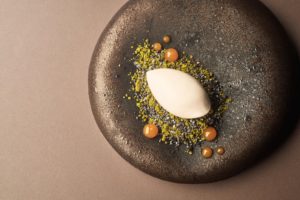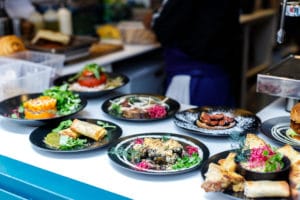In his introduction, Régis Marcon reminds us of the essential definition of gastronomy. For the Chef, gastronomy is the art of eating well and sharing moments.
He underlines the fact that gastronomy has always evolved with the times and fashions. And from all these years of practice as a Chef, his current observation is one of transparency. Today’s customers want to know everything about the product they are eating, for the sake of quality but above all for health. This is why Chefs must adapt to really know the products they work with and be able to explain them to their customers.
Being a Chef means having enough knowledge to cook healthy food. In this respect, Régis Marcon thinks that it is essential to have content on nutrition in hotel training programs.
Plants have a future; they are gradually moving away from their secondary role as an accompaniment to a dish, and are willingly accepting to play the leading role and even to be the exclusive protagonist. For Régis Marcon, plants as the only dish may be the future of cuisine…
Organic, local and seasonal
Bruno Parmentier‘s presentation on this issue was interesting. Author and consultant on the environmental issues of food, Bruno Parmentier asks us the question “What is ‘eating well’? Eating is a fundamental act, for us and for our planet. So it is essential to stop for a moment and think about the issue and perhaps start by asking “What does it mean to buy “well”?” Organic, local, seasonal… our consumption choices are our own and the future of our food depends on how we buy.
Florent Guhl is the Director of the Bio Agency. He notes that organic food interests the population and allows people to ask themselves real questions. Organic food is forcing everyone to reappropriate the issue of food, or at least to ask questions and think about it, and this is already a step towards change.
The main motivations for consumers to go organic are health, the environment and product quality. Beyond these motivations, most organic consumers also pay attention to their lifestyle and generally have a global approach. Organic can therefore be everyone’s business and it is also up to us to give it sense.
Raising awareness among Chefs
In order to raise awareness of the importance of plants among Chefs, Régis Marcon gives an example by working on the subject himself. In his restaurant, the Chef offers an experience based on plants. Clients like the approach and that is why they come back.
By taking inspiration from his peers and little by little, a Chef can go and find tools to help himself, go and see what others are doing, and take an interest in other ways of working. The question is to know if the Chefs really want to try this new cuisine.
For Régis Marcon, a door is opening on plant-based cuisine and it is important that Chefs take a serious interest in it. There are many opportunities. Herbs, spices and different fats are the keys to making a good plant-based dish, as long as they are used correctly. Today there are other ways of doing things… ways of enhancing a dish with what nature gives us, in the simplest way.
The future is plant-based
Chefs have now integrated the notion of seasonality and proximity. But they still have difficulty with plants. This symposium also highlighted the difficulty that Chefs have in going further.
Vegetarian, why not, but certainly not vegan. The word “vegan” is still misunderstood. Some people still think that it only refers to fruit and vegetables, others to seeds, others to fertile land and agro-forestry… The word “vegan” is barely pronounced and disturbs people’s minds.
We are not there yet, and we can say that it is not so bad to bring together people from the food industry to discuss the future of cuisine.
In my opinion, there is still far too much talk about meat and fish in these presentations, food innovation is not sufficiently discussed and the speakers are not sufficiently targeted. It would be interesting to bring in Vegan Chefs who have advanced knowledge on the subject, to bring a real asset to the debates.
Mix styles, diversify genres… After all, as in our plates, we could diversify the colours and be a bit more daring so that we all open our appetite and participate in the food transition.





